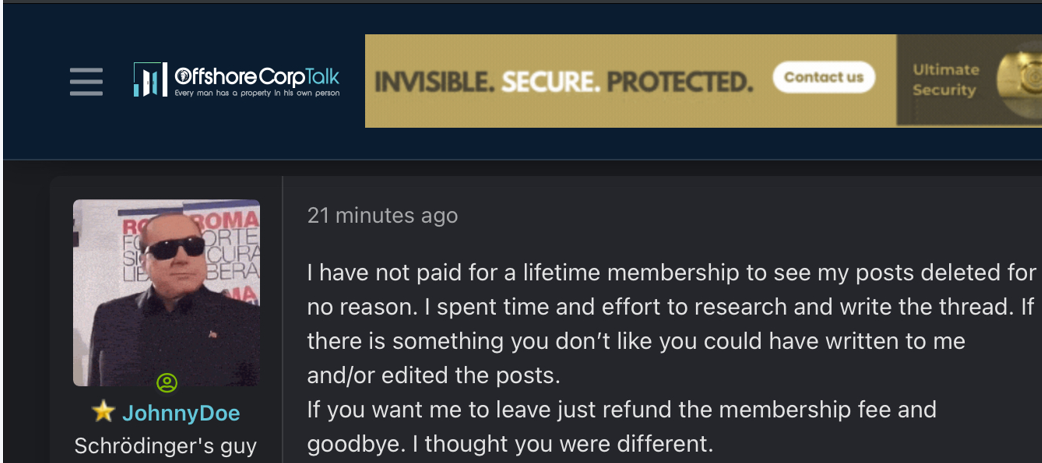Complaint Review: Wachovia Bank N.A. - Charlotte North Carolina
- Wachovia Bank N.A. 1525 West W.T. Harris Boulevard Charlotte, North Carolina United States of America
- Phone: 922-6842
- Web: wachovia.com
- Category: Banks
Wachovia Bank N.A. Wells Fargo Company Erronious assessment of NSF Fees Charlotte, North Carolina
*Consumer Comment: Striderq is correct to a point..
*UPDATE Employee: Opt out option
*Consumer Comment: Agree with Tim..
*Consumer Comment: DON'T depend on online statements!
*Consumer Comment: Regardless of the banks tactics...you messed up...
*Consumer Comment: TONY, DON'T BOTHER SUING THESE BANKS. IT WILL NOT BENEFIT YOU OR....
listed on other sites?
Those sites steal
Ripoff Report's
content.
We can get those
removed for you!
Find out more here.
Ripoff Report
willing to make a
commitment to
customer satisfaction
Click here now..
With an account balance of nearly $500 on Friday, I made several transactions over the weekend. When I check my account balance on Monday, I find that I have only $60 left in my account. To my surprise on Tuesday, my account is negative due to the assessment of $140 in NSF Fees.
When I call to get an explanation, I was told that the NSF Fees were applied because the Items still on hold pending from the weekend had depleted my account leaving no money left to cover the purchases made on Monday, when there was $60 in the account listed as 'Available Funds'.
Furthermore, when I examine the balance of my account on Wednesday, I find that another accumulation of $140 NSF Fees have been applied because the same items that were on hold had been posted. The same items that Wachovia said they were holding for specific transactions and therefore could not be spent elsewhere to prevent the NSF Fees from the previous day.
When I call for an explanation this time as to why there was an additional $140 in NSF Fees, I was told that it was because the money in my account that on hold and designated for specific transactions was applied to the negative balance, the same negative balance that was created because the money was on hold and therefore not able to be spent. Since that money was applied to Wachovia's NSF Fees (and not to my transactions that posted before the hold amounts), when those items that were supposed to be on Hold did post, that money was no longer there to clear those items that had been on hold. The result being the assessment of $140 in NSF Fees for two days in row for the same four transactions.
The infuriating part is that Wachovia cannot give a straight and consistant answer for the logic of transaction posting. Money cannot be managed properly with a system like Wachovia's that is not consistant. Due to this Wachovia will no longer be the tool that I use to manage my finances.
It is my intent to join in any existing Class Action Law Suit against them. If there is not one, it is my intent to open one. If this case seems viable, I would love to speak with any interested parties.
This report was posted on Ripoff Report on 11/04/2009 08:02 AM and is a permanent record located here: https://www.ripoffreport.com/reports/wachovia-bank-na/charlotte-north-carolina-28256/wachovia-bank-na-wells-fargo-company-erronious-assessment-of-nsf-fees-charlotte-north-c-519339. The posting time indicated is Arizona local time. Arizona does not observe daylight savings so the post time may be Mountain or Pacific depending on the time of year. Ripoff Report has an exclusive license to this report. It may not be copied without the written permission of Ripoff Report. READ: Foreign websites steal our content
If you would like to see more Rip-off Reports on this company/individual, search here:
#6 Consumer Comment
Striderq is correct to a point..
AUTHOR: Ronny g - (USA)
SUBMITTED: Friday, November 06, 2009
"Actually this is already available of Wachovia. However a little explaination is needed. This is talking about the use of your debit card only. If you opt out, then your card will only be approved if the transaction is less than your current available balance. If you have $20 available and try to spend $20.01 it will be declined. But if you have checks or automated debits that your didn't list in your register then when they are presented they may cause OD fees to be accessed. The only way to prevent any OD fees is to keep an accurate register, subtract all card usage, checks, auto debits when you authorize them, add deposits when they are available in your account. Keep this register balance positive and you will get no OD fees."
Currently..the "opt out" is only designed to protect the debit card from being used at a point of sale or an ATM if there is not enough in the account to cover the transaction. The reason many banks have changed policies to now allow opt out..or will in the future..is because too many customers were angry that the card was allowed to be used for small purchases after the account was below zero..and were being charged an additional 35 dollars or so for each transaction, plus any additional caused by bank time and order manipulations.
Actually the change is not so much about "allowing" opt in..but preventing the bank from automatically enrolling every single customer "in" the courtesy overdraft protection service..whether they wanted it or not. So the change is more about choice of how the customer sees fit to control their account..how they chooses to "protect" it..and how the bank will not if opted out allow transactions to go on and on at 35 dollars or so a pop without notifying the customer they are in overdraft..or declining the transactions.
Of course keeping an accurate register is very critical...but if it was 100% what would be the point for overdraft protection in the first place?
Now Striderq is correct that checks will bounce and be subject to NSF fees..as well as ACH..so this policy change does not only still require customer responsibility..but actually more-so since a check bouncing will usually incur a double fee..instead of a single if covered in OD protection. There is talk of possible changes to better protect checks and ACH even if opted out of OD protection. The reason being is that policies such as courtesy OD protection and re-sequencing were put in place to protect large transactions such as mortgage payments. Now although a debit card is nothing more then access to your checking account..it is not used by most people as you would use checks...such as buying a fast food lunch or coffee..so in reality, the policies for checks..really have no use but potential financial devastation and harm to someone who uses a debit card for mostly small everyday purchases and lives paycheck to paycheck.
Opting out is a good choice however for the low balance customer who uses the debit card mostly in lieu of cash to make many small purchases. Most complaints regarding OD fees are due to an error from this activity..and unbeknownst excessive fees that result..and the FDIC report states most OD fees have occurred at point of sale and ATM withdrawals...so this policy change may be a good choice for many customers. But it still requires caution..maybe more-so. I have been opted out for over a year and for me it's been piece of mind..as I do not make a habit of overdrafting anyhow..and I do not use checks..if so extremely rare but I do not remember the last time. I feel safe that if a merchant hold, unauthorized use etc was to happen..that when I use the card to buy lunch or a movie..whatever..that it is not going to cost me an extra 35 dollars per.
The card will be declined..and I am given ample opportunity to find out why I am overdrafted even though my register does not agree. And to me..THAT is true protection.
"The way Wachovia posts is this: Take the posted balance from the previous business night, subtract the entire amount of holds giving available balance, add any deposits and credits for that business day, subtract debits from largest to smallest. Any item that posts to a negative available balance or negative posted balance will be accessed an OD fee. Hope this explains what happened."
This does explain what happened..and is also the crux of the pending lawsuits and legislation.
#5 UPDATE Employee
Opt out option
AUTHOR: Striderq - (U.S.A.)
SUBMITTED: Friday, November 06, 2009
Actually this is already available of Wachovia. However a little explaination is needed. This is talking about the use of your debit card only. If you opt out, then your card will only be approved if the transaction is less than your current available balance. If you have $20 available and try to spend $20.01 it will be declined. But if you have checks or automated debits that your didn't list in your register then when they are presented they may cause OD fees to be accessed. The only way to prevent any OD fees is to keep an accurate register, subtract all card usage, checks, auto debits when you authorize them, add deposits when they are available in your account. Keep this register balance positive and you will get no OD fees.
The way Wachovia posts is this: Take the posted balance from the previous business night, subtract the entire amount of holds giving available balance, add any deposits and credits for that business day, subtract debits from largest to smallest. Any item that posts to a negative available balance or negative posted balance will be accessed an OD fee. Hope this explains what happened.
#4 Consumer Comment
Agree with Tim..
AUTHOR: Ronny g - (USA)
SUBMITTED: Friday, November 06, 2009
You can find a local bank or credit union that will have more fair and customer friendly policies. I was recommended to a several credit unions from friends..and they all have better policies for the consumers. Overdraft forgiviness..checks clear much quicker..direct deposits available sometimes 24 hours sooner, much lower fees and actually show concern to thier customers if a problem or issue arrises.
Again..it is still up to you to know what is in your account vs. what you spend..but sometimes circumstances happen in which we would think a bank would work with us..but it seems these days they work more against us. For whatever laws they have..the banks do at times try to skate around them..same if you report fraudulent activity or a dispute..many banks tell the customer there is "nothing we can do"..when they know d**n well the customer is supposed to be given a Federal Regulation E dispute form, which can easily be faxed or mailed to them.
I am not a big fan of Government intervention (they should never have given these banks a dime IMO..now they own the problem)..but sometimes our lawmakers can actually come up with laws that can help keep us from getting fleeced by shady deals, and that at least gives you something back for your tax dollars.
#3 Consumer Comment
DON'T depend on online statements!
AUTHOR: Tim - (U.S.A.)
SUBMITTED: Friday, November 06, 2009
I'm usually one to side against the banks as well, but yours is clearly an issue of over-reliance on the automated system.
It is convenient to have your account information available with the click of a mouse, but you MUST still keep track of your balance independently. The automated system has these "lags" built into it, and sometimes they seem rather dubious.
But in your case, the only real issue you have is that the bank continued to allow you to conduct transactions when you had no money in your account, for which you were subsequently penalized.
In general, I would recommend that everyone switch to a small, locally owned bank or a credit union. This particular OP would have experienced the same problem regardless. But you're much less likely to run into traps that seem downright fraudulent, and much more able to correct errors, when you're not dealing with a "mega-bank."
As for the second rebuttal, I don't agree that the cards are entirely stacked against the consumer per the law. There are laws in place to protect consumers from many egregious practices that banks undertake on a regular basis.
Regulation cc, for example, places limits on deposit holds, and states that any hold that is "unreasonable" is illegal. I once deposited a large, certified check into a Chase account. After five days of waiting for Chase to release GUARANTEED funds, I called the issuing bank, who informed me that the check cleared the day after I deposited it, and that Chase had possession of the funds the day after that.
Within a half hour of explaining to the branch manager that it was "unreasonable" for them to hold my funds past the second day, and that the continued hold violated Regulation cc, the money was available.
Lesson learned by me: familiarize yourself with the laws and regulations applicable to banks, and don't be afraid to throw around some threats of legal action.
Lesson hopefully learned by the OP: get your money out of the big banks, and never depend on your online statement.
#2 Consumer Comment
Regardless of the banks tactics...you messed up...
AUTHOR: Ronny g - (USA)
SUBMITTED: Thursday, November 05, 2009
This may surprise some of the bank defenders..because I generally place most of the blame on the banks..but in this case you admit in your first sentence..."With an account balance of nearly $500 on Friday, I made several
transactions over the weekend. When I check my account balance on
Monday, I find that I have only $60 left in my account.
In all honesty..you should know what is in your account already and not depend on the online statement.
I know the statements are deceiving..and the banks uses policies and tactics to make it easier to overdraft IF you depend on the statements only..and fee you more then you actually overdrafted for by re-sequencing the times of transactions...but you need to keep track yourself to help prevent this. There are lawsuits pending against many of the major banks due to this and you can do a Google search if you want to be involved. Or contact
Lieff Cabraser Heimann & Bernstein, LLP
Michael W. Sobol, 415-956-1000
or
Bruce S. Rogow, 954-767-8909
Permalink: http://eon.businesswire.com/news/eon/20091020005332/en/fee/overdraft/lieff-cabraser
or
Finkelstein Thompson LLP
Now when you say you were charged NSF fees..was this from writing checks or a debit card? Normally if you are using the debit card after the account is drained..the bank will cover it and charge you for an "overdraft fee".
You may want to consider opting out of overdraft protection..Wells Fargo will allow that soon...copied from a recent article...
Wells Fargo will eliminate overdraft fees for customers when they overdraw their accounts by $5 or less and will charge no more than four overdraft fees per day. In addition, Wells Fargo and Wachovia customers will be able to opt out of overdraft coverage, meaning customers can specify that they dont want their transactions authorized into overdraft if funds arent available to cover the transaction.
Now this does not excuse you from not keeping track and being responsible with your account to the penny...but it is added "protection" if you mess up again...the card will be declined at a point of sale or an ATM swipe if the funds are truly unavailable..even if the bank statement and your register says funds are available..we all can make a mistake..especially if we keep a low balance and use the card a lot..so if the card is declined it may be embarrassing and inconvenient..but at least you won't be charged hundreds of dollars in fees for a mistake or carelessness, a check deposit that takes too long to clear..a direct deposit that is late..an electronic payment that comes in early or any number of ways there are to mess up and unknowingly overdraft...and it will also protect the account being drained past zero due to fraud, theft, merchant and bank mysterious holds..and excessive check clearing times.
It seems easier to me then trying to have the bank explain what happened and they can't even explain it clearly. For me personally..I would never overdraft with intent since I use my card for small purchases often enough to know not to pay $35.00 for a coffee or burger..so I have no use for overdraft protection whatsoever. If you opt out just be careful if you still write checks because the bank could decline it..charge you an NSF..and then you may be charged to whomever you wrote the check to if it bounces. Now 2 fees are better then 4...but no fees are better then any.
#1 Consumer Comment
TONY, DON'T BOTHER SUING THESE BANKS. IT WILL NOT BENEFIT YOU OR....
AUTHOR: Karl - (U.S.A.)
SUBMITTED: Thursday, November 05, 2009
ANYONE ELSE!!! Simply CANCEL your account with the bank NOW! Open up an account with a Credit Union in your town. The U.S. Legal System is also on the side of the large corporations like- Wachovia, Bank of America, Wells Fargo, Chase, Goldman Sachs, Toyota, GM, AIG.................... & all the others.

Advertisers above have met our
strict standards for business conduct.






































